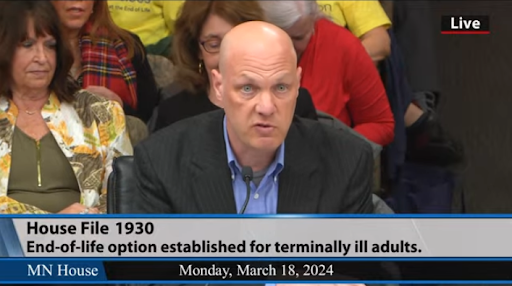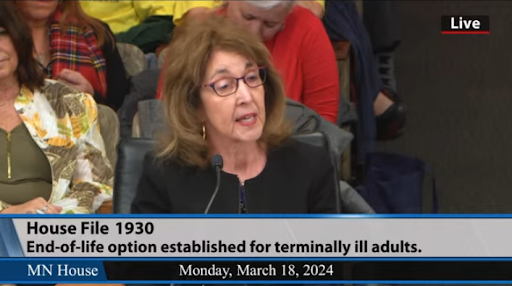End-of-Life Options Act Passed by House Commerce Committee
Mar 18, 2024
Bill Continues its Historic Momentum, Advocates Push for Floor Votes

The End-of-Life Options Act passed through another committee Monday when the Minnesota House Commerce Committee voted to approve it. The proposed legislation next moves to the Ways and Means Committee, its last stop in the House committee process.
The House Health Finance and Policy Committee’s supportive vote in January marked the first time the legislation had been voted on by Minnesota lawmakers following nearly a decade of work by advocates, and the bill has seen consistent momentum since.
“Today’s vote is the fourth Minnesota House committee that has carefully considered this legislation and moved it forward this year,” said Rebecca Thoman, M.D. Minnesota Campaign Manager for Compassion & Choices Action Network. “The End-of-Life Options Act respects the autonomy and personal decisions of adults facing terminal illnesses, while including robust safeguards to ensure that the process is transparent, voluntary, and medically sound. Minnesotans facing terminal illnesses can’t afford any more delay – we urge the legislature and Governor Walz to enact the End-of-Life Options Act this year.”
Monday’s hearing focused on sections of HF1930 pertaining to life and health insurance protections for terminally ill patients who choose the option of medical aid in dying and/or include it in their advance directives.
Dr. Thaddeus Pope, a professor at Mitchell Hamline School of Law who has written over 300 articles and two books on end-of-life healthcare decision-making, delivered his expert testimony on why the discussed sections are standard as per the precedent set by Minnesota Statute 145C, enacted in 1993.
“Like HF1930, 145C.12 prohibits insurance policies from being affected by an individual’s healthcare treatment choices. Minnesota patients use 145C every day, when terminally or seriously ill patients withhold or withdraw life-sustaining treatment and that causes their death,” Dr. Pope testified. “145C prohibits health and life insurers from considering such choices in whether or how to write insurance policy. HF1930 similarly prohibits health and life insurers from considering patients’ choices for [medical aid in dying].”
Dr. Ellen Kennedy, Executive Director of World Without Genocide and adjunct professor at Mitchell Hamline School of Law, testified before the committee on the distinction between medical aid in dying and suicide.
“This act is very clear: persons who self-administer medication, in compliance with the strict requirements and protections for medical aid in dying, are not dying of suicide. Therefore, benefit payments cannot be excluded. This bill safeguards the insurance policies of families and patients who seek to use this option, and I urge your support,” Dr. Kennedy said.


Dr. Thaddeus Pope and Dr. Ellen Kennedy testify before the House Health Finance and Policy Committee Hearing on Monday.
The bill is modeled after Oregon’s medical aid-in-dying law, enacted 26 years ago. To qualify, a patient must be at least 18 years old, mentally capable, and diagnosed with a terminal illness with a prognosis of six months or less to live. Individuals are not eligible for medical aid in dying solely because of age and/or disability.
Eligible patients must make one oral request and one written request to the attending health care provider and one oral request to another consulting health care provider. Individuals must be able to self-ingest the medication.
No one – no patient, doctor, nurse, pharmacist, or health care facility – would be required to participate.
Strong support among Minnesotans
Results from the most recent annual Minnesota House of Representatives poll at the State Fair found that nearly three-quarters of respondents support allowing Minnesotans the end-of-life care option of medical aid in dying to peacefully end unbearable suffering.
The State Fair poll included this question: Should terminally ill adults have the option to end their lives with the assistance of health care providers?
Yes — 73.2% (5,844)
No — 18.2% (1,456)
Undecided/No Opinion — 8.6% (686)
Those results are an increase in support from the last time a similar question was posed to Fairgoers in 2016. That year, 67% supported the measure. A scientifically conducted survey by Greenberg Quinlan Rosner Research in 2016 found 73% of Minnesotans support the measure.
Medical aid in dying is an end-of-life care option in 10 states (California, Colorado, Hawaii, Maine, Montana, New Jersey, New Mexico, Oregon, Vermont, Washington), and Washington, D.C.
About Compassion & Choices/Compassion & Choices Action Network:
Compassion & Choices is comprised of two organizations that improve care and expand options at life’s end: Compassion & Choices (501(c)(3)) educates, empowers, defends, and advocates; the Compassion & Choices Action Network (501(c)(4)) focuses exclusively on legislation, ballot campaigns, and limited electoral work.
Supported in part by Compassion & Choices Action Network.


